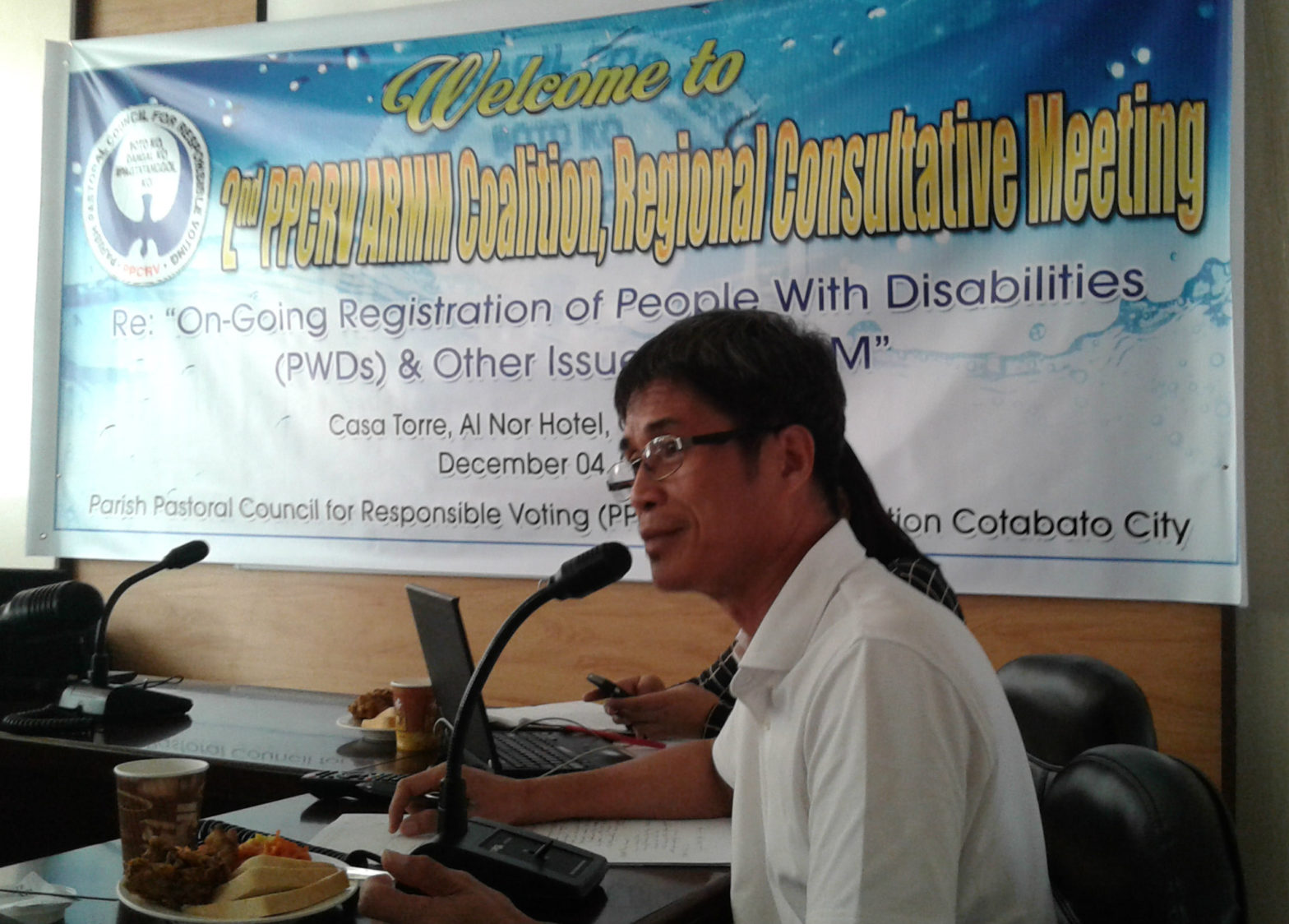By JAKE SORIANO
COTABATO CITY– Lack of information dissemination, accessibility of polling centers, and security are some of the major issues raised by groups promoting the rights of voters with disabilities in the Autonomous Region in Muslim Mindanao (ARMM).
In a dialogue here between government agencies and nongovernment organizations a year and a half away from the 2016 presidential elections, PWD advocates across the region raised concerns over difficulties faced by voters with disabilities.
These voters will also have to take part in a plebiscite next year should the Bangsamoro Basic Law (BBL) be signed into law soon, and the election of Bangsamoro officials in 2016.

In some areas in Maguindanao, for instance, stigma against PWDs is still pronounced, said Majeed Andong of the organization Kabalikat Civicom during the dialogue on Thursday organized by the ARMM coalition of the Parish Pastoral Council for Responsible Voting (PPCRV).
“Ayaw bumoto ang PWD kasi kakantyawan siya (PWDs hesitate to vote because they would face ridicule),” he said.
Mahdie Amella of the Mindanao Action for Peace and Development Initiatives (MAPAD) also said that PWDs and their families not only contend with “hiya” or shame but they also fear unforeseen violence.
“Sa context ng Maguindanao na conflict-affected area, natatakot ka pa rin na may maglagay ng bomba (Because Maguindanao is a conflict-affected area, people are still scared that bombs might suddenly go off in public places),” Amella said.
He added that those with disabilities are left at home, away from harm’s way
Andong and Amella agree these factors contribute to challenges in getting PWDs to register.
In Lanao del Sur and Marawi City, age-old security and logistical concerns continue to marthe overall voter registration and elections.
ARMM Police Community Relations Officer John Roderick Morales said that the lack of proper recording of PWD voters creates problems for authorities tasked to monitor the peace and order situation in these difficult areas.
“There is no problem with obvious PWDs,” he noted. “Kapag dumating sila pananaka-wheelchair, iyong queue, umaatras (When an old man in a wheelchair arrives at a polling precinct, people in line immediately give way).”
But he said that people with questionable intentions are “manipulating these terms” like “PWD voter” or “illiterate voter” for possibly dubious ends.
Morales cited his experience in the town of Butig, Lanao del Sur, where close to the end of polling, some 80 men arrived and told officials they were illiterate. Authorities later found out most of them were not.They arrived after three in the afternoon, he said.
“Kasi three o’clock, malapit na dumilim (Three o’clock in the afternoon is close to dusk),” he explained. “Kapag dumilim na, hindi na kami safe (And when it’s dark, it’s no longer safe).”
Aiding PWDs to vote
Meanwhile, in the island provinces of ARMM – Basilan, Sulu and Tawi-Tawi (BaSulTa) – the geographic landscape itself is a barrier to a successful information drive to encourage PWDs to register and to vote.
“Sa Bongao proper, hindi problema kasi pwedei-motor(Centers like Bongao are easy to navigate via motorcycle),” said Jose Abendaño, the coordinator for the PPCRV BaSulTasub-region.Reaching island municipalities, however, is a challenge because of lack of transportation options.
On the part of the Commission on Elections (Comelec), Election Officer Mary Ann Mangudadatu urged barangay officials within ARMM to request for off-site registration, as they have the power to do so.
“Even the mayor cannot request. It should emanate from the office of the barangay chair,” she explained.
Based on Comelec data as of the October 2013 barangay elections, there are 2,353 registered PWD voters for Maguindanao; 1,333 for Basilan; 667 for Tawi-Tawi; 333 for Lanao del Sur; and 326 for Sulu.
“The Commission has a very favorable policy for PWDs,” added Mangudadatu.
But in some areas, accessibility during registration and elections day remains a huge concern.
“Pagdating sa elections, hinihingi ng PWDs na sana doon sila sa ibaba (During elections, PWDs want to be allowed to vote on the first floor of poll buildings),” said Mariam Ali of the Mindanao Organization for Social and Economic Progress (MOSEP).
She reminded stakeholders to take note of lessons and mistakes from the previous voter registration period.
“Last registration, nakaligtaan yung supplemental form (The supplemental form for PWDs was not provided for them during the last registration period),” Ali pointed out.
In 2012, VERA Files reported that the Comelec in ARMM allowed PWDs to register but failed to provide them with the formwhere they could input the types of assistance they would need for the day of elections.
“Panawagan natin sa Comelec na sana maayos ito (We urge Comelec to address this concern),” added Ali.
Raising awareness
Maribel Buenaobra of The Asia Foundation said PWD issues in ARMM are now competing for attention with other developments such as the creation of the Bangsamoro.
“Maraming nangyayari ngayon sa Mindanao.Baka ang usapin tungkol sa persons with disabilities, hindi masyado mapansin (With recent developments happening now in Mindanao, PWD issues might not be given proper attention),” she said.
Some of the action steps decided towards the end of the meeting were the creation of a unified campaign message encouraging PWDs to register, and the translation of materials relevant to the elections into local dialects.
Fr. David Procalla, PPCRV’s regional coordinator for Mindanao and the ARMM, vowed that where before information dissemination campaigns were “school-based, community-based and media-based,” the coalition would now also make it “church- and mosque-based.”
The meeting was the second in a series by PPRCV to discuss the ongoing registration of PWDs and other issues in ARMM. The first was in June this year. Another stakeholders meeting is being set for January.
